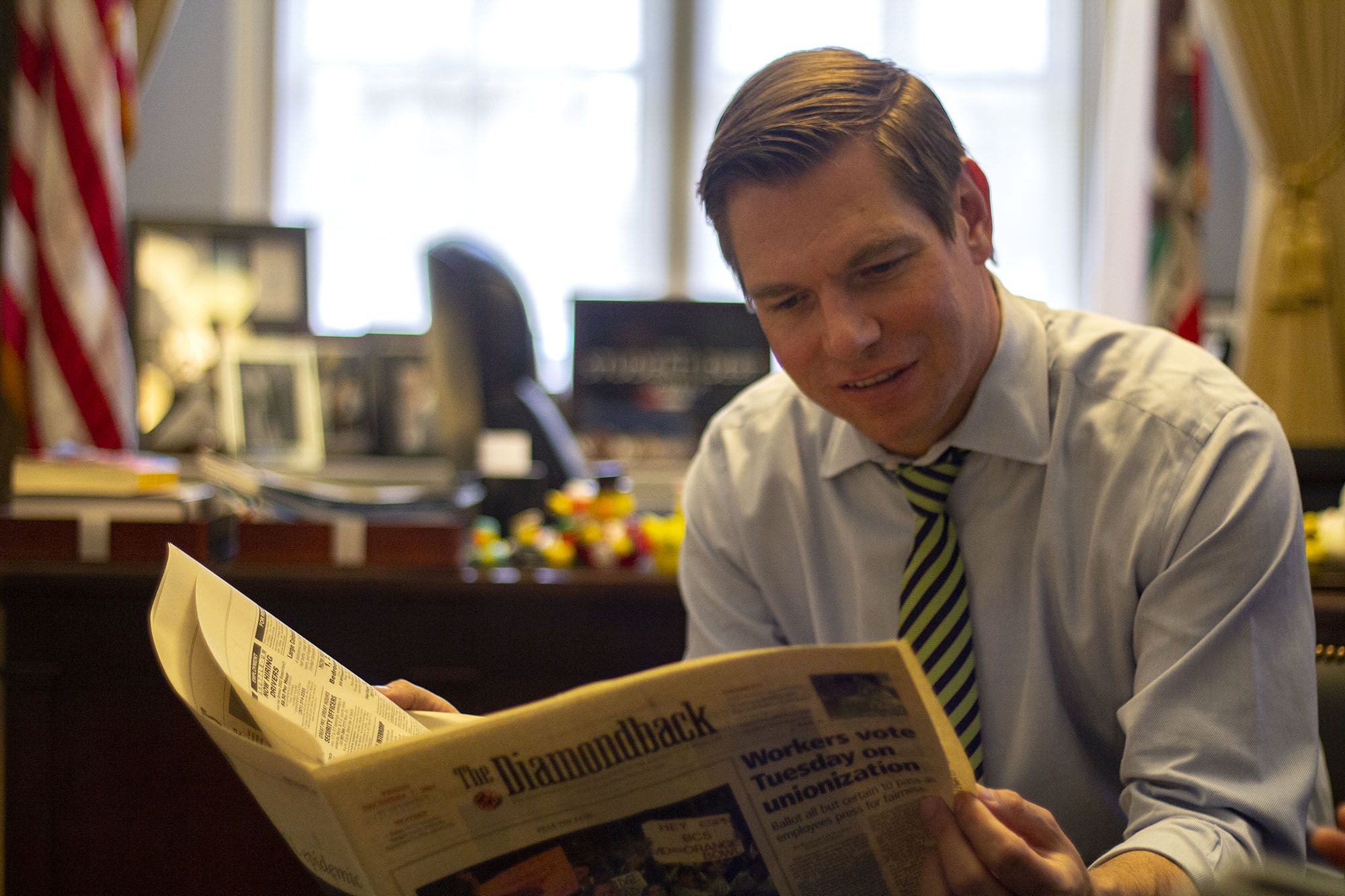Views expressed in opinion columns are the author’s own.
California congressman Eric Swalwell announced he’s running for president to no fanfare, but he’s a University of Maryland alumnus, so we must pay some attention. And Swalwell, it turns out, is actually more interesting than first meets the eye. Not because he’s much more than a replaceable white congressman, but rather because witnessing the sheer scope of his dullness is a transcendent experience.
Allow me to quote a short passage from his announcement speech: “I have come home to Dublin to tell you a story about America. It is my story. But it is your story, too. It is a story that belongs to all of us. It is about going big, being bold and doing good.”
I mean, this is really remarkable. You have the halting, lumbering steps toward biography (he grew up “right smack in the middle of the middle class”). You have a campaign slogan where the first two parts — going big and being bold — basically mean the same thing, and the third part — doing good — is nearly identical to his alma mater’s branding.
Unfortunately, aside from a welcome focus on gun control, the rest of the speech is just as vapid. Such a lifeless piece of political rhetoric demands answers. How could this happen? How does an Eric Swalwell come to be? What on earth went wrong?
My theory? Swalwell is what happens when Student Government Association kids get older but don’t grow up.
Swalwell was an SGA member at this university, which is key to understanding him. A big part of SGA culture, so far as I can understand it, is political cosplay. One envisions oneself as a character in “The West Wing”: practicing retail politics by nagging people trying to enter the dining hall, tweeting pictures with your suit-clad friends in front of some congressperson’s office and scheduling a lot of coffee meetings.
Various forms of cosplay are a natural part of the college experience — college newspaper columnists are not immune. But the important thing is that you grow up at some point; you stop playing a character and start having an actual personality. Swalwell, quite tragically, seems not to have outgrown the political cosplay phase. He’s still auditioning for the role of “inspiring young politician on the rise,” and you hate to see it.
In the announcement speech, and his general public persona, Swalwell hits all the notes you’d hit if your political worldview comes entirely from TV. He does the “we are in a grave historical moment” schtick by quoting that Lincoln line about “the stormy present” (which, incidentally, is the title of a “West Wing” episode). On Twitter, he sometimes does the “swaggering tough guy” schtick; once, he kinda sorta threatened to nuke some random Second Amendment enthusiast.
And it wouldn’t be political cosplay if Swalwell didn’t do the “sober appeal to bipartisan cooperation” schtick. In his announcement, he declares, “We must unite our deeply divided country, so I pledge to lead our country with a team of rivals, a blended cabinet of Republicans and Democrats.”
To think the Republican Party is in any way redeemable is, of course, the height of naivety, and it brings us to a serious danger of political cosplay: Sometimes, you play your character with such conviction that you start to actually think like him. The lines between you and your role start to blur. When I look at Swalwell, I often have trouble figuring out whether he’s saying something for the sake of performance or if he’s come to earnestly believe it.
While some politicians (John Kasich, for example) are obviously being calculated in adopting an earnest persona, it’s harder to say with Swalwell. That’s the scariest thing about his insistence on reaching across the aisle. The recent history of American bipartisanship includes such “solutions” as the Clinton crime bill, the PATRIOT Act, the 1999 financial deregulation package and, most notably, the Iraq War. It’s a history of austerity and abuse and war. If Swalwell has come, through repeated performance, to believe his own rhetoric on this stuff, well, that’s a cause for concern.
I should be clear, I don’t think Swalwell is himself dangerous; the poor guy’s not getting anywhere near the presidency. But he’s a lesson in what happens when political cosplay persists beyond college. I’m scared of all the little Swalwells — some of whom live and study among us — marching through elite institutions, cosplaying their way to authentic, terrible convictions.
Max Foley-Keene is a junior government and politics major. He can be reached at maxfkcap2016@gmail.com.



